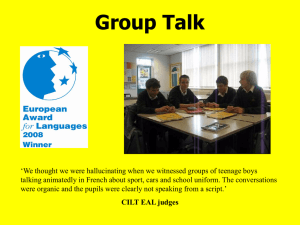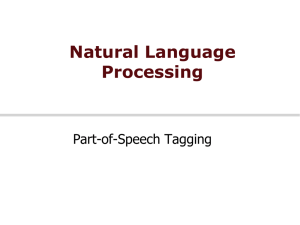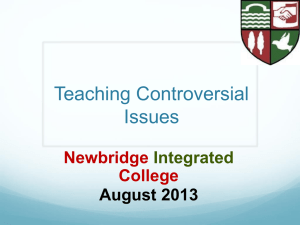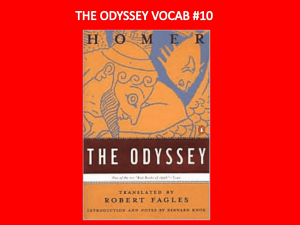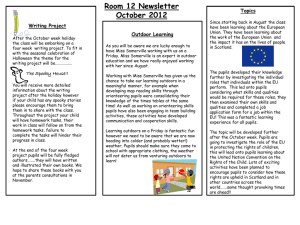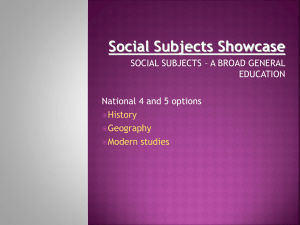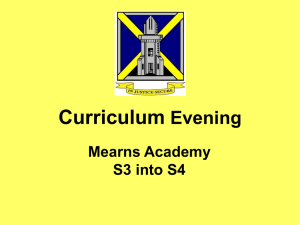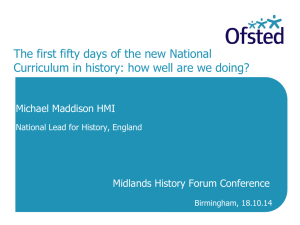New POS
advertisement
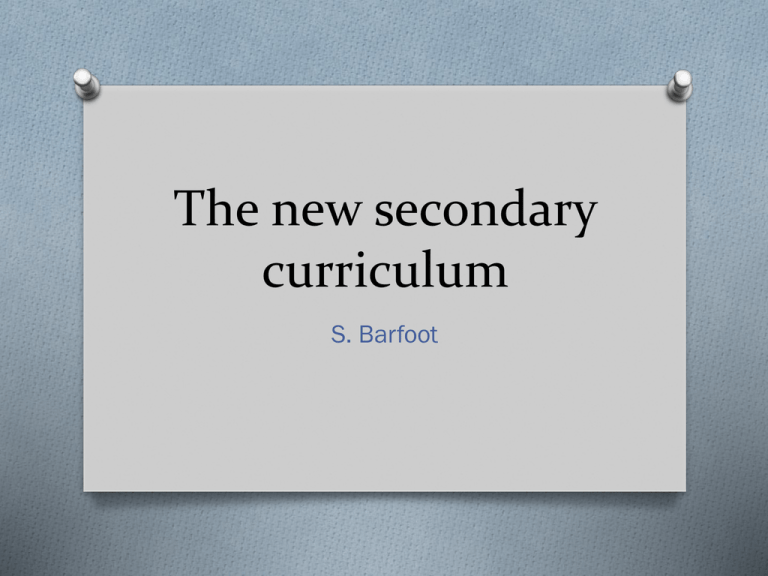
The new secondary curriculum S. Barfoot Aims O to review the new POS for KS3 languages and discuss the changes it may bring with it. O to identify key areas for development at KS3 which might also help prepare us for new assessments at KS4. O to explore the possibility of initiating some joint changes across the RTSA. QUIZ O Comparing the old and the new: In teams of 2 see how well you know the current POS by answering the 6 questions on the sheet. 1. a In the 2003 POS there was a long list of topics but…….there have been no statutory topics since then. The dominance of topics comes mainly from text books, the way the QCA SOW is presented and the insistence of GCSE exam boards on organising content around topics 2. d Schools can decide how often they want you to report your levels internally. There is no statutory requirement to report NC levels in any non-core subjects at KS3 3. c NC levels were designed as a tool to enable the uniform measurement of pupil progress between Key Stages – not to level activities or progress over short time phrases. “There is a lot that goes into each level and the idea that pupils can move between them in a lesson, or even a course of several lessons reduces the levels to a ‘label’ rather than a genuine assessment of the mastery of essential knowledge and skills which pupils need in order to progress”. 4. a There is no statutory measure of progress that a pupil should make at KS3. 5. a – i are all in the current POS only j and k are not The Implications – how will the new POS affect us? The current Year 7 pupils will be the first to take the new GCSE Emphasis on: Skills and Core Knowledge – not Content Freedom and Flexibility – no prescribed approach or assessment Rigour – a genuine understanding of how a language works, not “level 6 because I can say je vais aller au parc!” Manipulation of TL – not memorisation Authentic Language and an increased Awareness of the Culture in the countries speaking that language Creativity – inspiring them Why change? Discussion: Have a look at the new POS for KS3 and talk on your table about the following: O What differences do you notice? O What do you think the motivation behind the changes are? What is the ‘expected’ result? What are the advantages and disadvantages of the following: 1. The new POS is short + lacks prescriptive detail 2. The new POS refers to ‘transcription’ 3. There is reference to ‘translation’ 4. There is reference to ‘literary texts’ Advantages and Disadvantages: Back to the question “Why change?” Do we think the overall changes are positive or negative? If we look at what the ethos behind the POS is then it helps us to understand how to implement it sensibly: Rigour Freedom Raising the bar especially for lowest and highest performing pupils Less prescription – no 3 part lessons, thinking skills, AFL, Improving ‘core’ knowledge Removal of National Curriculum Levels Increasing challenge and ambition Freedom to build in units of work which genuinely engage and motivate pupils Increasing cultural awareness through use of authentic material Freedom from ‘topic’ lists and prescribed content to concentrate on skills Assessment will need ‘genuinely’ reflect pupil ability Freedom to design SOWs and assessments which do not just serve to ‘label’ pupils but support genuine progression Some thinking behind the POS…… ‘We have specifically stripped out unnecessary prescription about how to teach and concentrated only on the essential knowledge and skills which every child should master……’ (Michael Gove) ‘these are challenging and ambitious programmes of study which focus tightly on the fundamental building blocks of study……’ (Michael Gove) KS2 POS: Have a look at the KS2 POS O Discuss what you read and notice in particular the emphasis on studying one language for the whole of KS2 What the new curriculum might look like in reality: Transcription + Translation: Should be…. O sentence / phrase level NOT like old style O’level where it was a defined activity in the exam O used to teach skills and precision rather than an assessment tool O a useful teaching device to build up awareness of sound-spelling, improve literacy and comprehension, grammatical awareness What the new curriculum might look like in reality: Literature: Could be a poem, song lyric, excerpt from a short story, film review, a cartoon or a magazine article NOT Goethe and Maupassant! What the new curriculum might look like in reality: Grammar for Communciation: Grammar should be about acquiring ‘core knowledge’ that leads to greater ability to comprehend and manipulate the language. “Among the main criteria affecting the quality of language provision is a clear understanding of how grammar teaching and communicative teaching can be integrated.” (DCSF research) A Brief History of Grammar: Grammar for grammar’s sake No grammar for communication’s sake Grammar for communication’s sake What the new curriculum might look like in reality: Assessment: Principles of assessment remain the same and schools will want /need to continue to measure and track progress. Most schools at the moment intend to retain National Curriculum levels BUT we will have to adapt them to address the new POS and feed into the new KS4 assessments The Practicalities: Are your SOWs good to go for your current year 7? We should: 1. Audit what is successful 2. Look specifically at the progression of skills development within the SOW and make sure it builds success 3. Build in reference to translation/transcription to the SOWs 4. Share ideas for including translation/transcription in depts as a way of promoting good practice 5. Create policies / mini units of work which address ‘literary texts’ which work alongside SOW 6. Re-evaluate assessments to include translation / transcription / grammatical progression where depts feel it necessary Discussion points for your depts: 1. Are our SOWs fit for purpose? (Especially thinking of the current year 7 who will sit a new style GCSE exam) 2. Is there a clear build up of grammar and skills which enables pupils to tackle ever more challenging work? Discussion points for your depts: 3. How are we going to explicitly build in regular opportunity to tackle translation and transcription? 4. Is there enough opportunity for pupils to read, hear, discover, explore pieces of authentic text – do we need some mini-units of work? Discussion points for your depts: Do we need to adapt our assessments for the current year 7 to prepare them for a final exam GCSE which may include small amounts of translation / transcription and move away from the memory game? 6. How are we going to ensure levels reflect genuine ability and progression – this will have a huge knock on effect on intervention for a final exam GCSE if we get it wrong! 5. Practical teaching strategies! Transcription – 4 ideas 1. la dictée préparée O Give pupils a list of words to learn in advance so the dictation is less threatening and doubles up as a spelling test. 2. la dictée a trous O Give pupils a text with words missing Miaou, miaou, Mon petit __________, Pourquoi es-tu si ______________ ? Miaou, miaou. Mon ________ _________, Faut pas pleurer comme ça. Ma ___________ est partie Pour chasser les _______________. Tout seul ________ mon panier, _________ je m'ennuie. 3. la dictée guidée O Read a slightly different version – good way to widen vocab. Rémy est un jeune rat qui aimerait devenir un grand cuisinier dans un restaurant parisien. Sa famille est très hostile à son projet parce qu’en général les rats ne….. 4. la dictée transformée O Teach / review grammar through transcription Je vais au parc PRESENT Je vais aller au parc PAST FUTURE Je suis allé au parc J’aime aller au parc LIKE CONDITIONAL J’aimerais aller au parc WOULD Je voudrais LIKEaller au parc Il3RD vaPERSON au parc SING Il3RD vaPERSON aller au parc SING FUTURE Il3RD estPERSON allé au parc SING PAST Il3RDaime PERSON aller au SING parc LIKE Il3RD aimerait PERSON aller SING au parc CONDITIONAL Il3RD voudrait PERSON aller SING au parc WOULD LIKE Practical teaching strategies! Translation – 4 ideas 1. la traduction littéraire O Use translation as an introduction to or consolidation of a literature focus 1. la traduction littéraire Dans une fabuleuse forêt, un gros monstre découvre un jour un étrange objet. Après l'avoir reniflé et léché, il le rejette, furieux. Ça n'a aucun goût! Pourtant, cet objet étonnant va changer sa vie... Une histoire drôle et touchante, qui raconte l'incroyable magie des livres. Une dame âgée a renoncé aux fêtes de Noël. Elle préfère rester bien confortablement chez elle. Ainsi, elle ne risque pas de s'exposer à tous les dangers comme glisser sur un trottoir glacé, attraper la grippe ou se faire attaquer par un brigand. Au moment où elle s'apprête à prendre un repas bien tranquillement assise devant sa télévision, on sonne à sa porte... Il était une fois un ours très heureux et très affectueux. Il avait tellement d'amour à donner qu'il faisait un câlin à chaque être vivant qu'il croisait dans la forêt. Mais un jour, il rencontra un humain armé d'une hache. Soudain, il n'eut plus aucune envie d'être affectueux... 2. la traduction parallèle O Focus on a grammar point or accuracy Le weekend mon copain adore aller en ville avec sa petite amie. Ils font du lèche-vitrine et mangent au McDo et puis ils vont souvent au cinéma pour regarder un film. _____ the weekend my friend __________ to go into town with _____ girlfriend. They _______ some window shopping and eat at MacDonalds and _______ they often _______ to the cinema _____ watch a film. 2. la traduction compétitive O Pupils race to translate sentences in turn 1. 2. 3. 4. 5. My cat is small and cute My cat loves milk, cheese and mice! My cat is called Milou and is 2 years old My cat sleeps on my bed My cat is adorable and I love my cat 4. la traduction à vendre O Pupils can earn ‘points’ by translating words – could play boys -v- girls. Some words are worth 2 ‘points if they should know them already!!’ Dans une fabuleuse forêt, un gros monstre découvre un jour un étrange objet. Après l'avoir reniflé et léché, il le rejette, furieux. Ça n'a aucun goût! Pourtant, cet objet étonnant va changer sa vie... Une histoire drôle et touchante, qui raconte l'incroyable magie des livres. Practical teaching strategies! Literature – discussion 1. Cher Frère Blanc 1 2 3 4 5 Cher frère blanc, Quand je suis né, j'étais noir, Quand j'ai grandi, j'étais noir, Quand je suis au soleil, je suis noir, Quand je suis malade, je suis noir, Quand je mourrai, je serai noir. 6 7 8 9 10 11 12 13 Tandis que toi, homme blanc, Quand tu es né, tu étais rose, Quand tu as grandi, tu étais blanc, Quand tu vas au soleil, tu es rouge, Quand tu as froid, tu es bleu, Quand tu as peur, tu es vert, Quand tu es malade, tu es jaune, Quand tu mourras, tu seras gris. 14 15 Alors, de nous deux, Qui est l'homme de couleur ? What would you do with this poem? What class would you use this with? How would it fit into your SOW? Assessment! Assessment! What we know at this point: Many schools intend to retain National Curriculum Levels We will need to adapt levels to suit the new POS – to include translation and transcription skills, to take the emphasis off memory, to reward creativity and grammatical accuracy etc. Final exam GCSE will mean we must be accurate in our assessments in order to best inform teaching and intervention.

